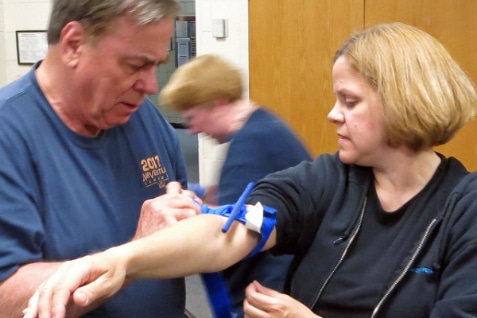All across Australia, volunteers lend their time and expertise to community and charity activities. But while they may not be ‘employed’ by any organisation, they are entitled to operate in a safe environment. According to the new WHS Act, the organisations for which they work must ensure their environment is safe.
Crucially, under the WHS Act, there is a difference between organisations that engage volunteers, and volunteer associations. A volunteer organisation conducts a ‘business or undertaking’ (whether for profit or not) and employs staff as well as volunteers. These organisations owe duties to their volunteers.
Volunteer associations, on the other hand, do not have any paid staff on their books, and so they do not owe duties to their volunteers.
An organisation can exercise its duty in a number of ways. For example, they can ensure relevant policies and procedures are distributed properly to all of their volunteers, and they can regularly consult with volunteers to ensure they are fully informed. Volunteers should also have access to any relevant training to ensure they carry out their work safely.
Of course, these duties can only be done to a degree that is reasonably practicable. So, certain factors will be taken into account by the authorities, such as the type of business or undertaking it is, the type of work the organisation carries out, and the nature of the risks associated with that work.
Clearly, it would be easy to get confused over the specifics of the WHS Act. But The Essential Guide to Work Health and Safety for Organisations that Engage Volunteers, published by Safe Work Australia, provides clear and detailed information.
Below, you can read extracts from that guide, but to read the full version simply click on the link above. Alternatively, visit the Safe Work Australia website for access to the full range of fact sheets relating to volunteer organisations.
Some Fact Sheets:
Do the Model Work Health and Safety Laws Apply to Your Volunteer Organisation?
A volunteer organisation owes duties to its volunteers under the WHS Act, where it:
- conducts a ‘business or undertaking’ (whether for profit or not), and
- is not a ‘volunteer association’ as defined by the model work health and safety laws
This means that the model work health and safety laws do apply if your volunteer organisation employs staff as well as volunteers to carry out work for the organisation. However, the model work health and safety laws do not apply to a ‘volunteer association’ (whether incorporated or unincorporated). Page 4 of this fact sheet sets out the definition of a volunteer association.
What is a ‘Volunteer Association’ Under the Model Work Health and Safety Laws?
A ‘volunteer association’ is defined as a group of volunteers working together for one or more community purposes where none of the volunteers (jointly or alone) employs any person to carry out work for the association. Volunteer organisations range from small informal community groups to large incorporated organisations. They may be unincorporated and incorporated associations. The WHS Act makes it clear that a ‘volunteer association’ does not conduct a business or undertaking and therefore does not owe duties under the WHS Act.
The main factors in determining whether a volunteer organisation is a ‘volunteer association’ are whether the organisation:
- conducts a business or undertaking, or
- its volunteers employ people to work for that business or undertaking
If not, the volunteer association is not covered by the WHS Act and will not owe duties to its volunteers under it. Nevertheless, even where the volunteer organisation does not fall under the work health and safety laws, it is prudent to comply with general work health and safety duties. The general law duties of volunteer organisations and volunteers are well established and Australian courts have long recognised that volunteers are owed a general duty of care by the people and the organisations they support.
What is a ‘Community Purpose’ Under the Model Work Health and Safety Laws?
The WHS Act does not apply to ‘volunteer associations’ where a group of volunteers is working together for one or more community purposes.
The term ‘community purposes’ is not defined in the WHS Act but is intended to cover things such as:
- philanthropic or benevolent purposes, including the promotion of art, culture, science, religion, education, medicine or charity, and
- sporting or recreational purposes, including the benefiting of sporting or recreational clubs or associations.
How do you Tell If Someone is ‘Employed’ by a Volunteer Organisation?
An employee contributes labour and expertise to the business or undertaking of an employer and is usually employed to perform specific duties. Under Australian law, an ‘employee’ is usually (although not always) someone who has a ‘contract of service’ with their employer to perform such work.
‘Contract of service’ and ‘contract for services’ are common law phrases that are used to distinguish between the nature of services provided by a worker to an employer. A person who is employed usually performs work under a contract of service. There are many other indicators of whether a person is likely to be considered an employee. These include:
a. whether there is an employment contract in place, even though a person may be paid a nominal amount in return for the work they are performing, this may still be sufficient to indicate that there is an employment contract in place
b. the level of control or right to control that the employer may exercise such as over the manner in which the work is performed, the place of work and the hours of work
c. whether the worker performs work for others (or is entitled to do so)
d. whether the worker has a separate place of work and/or advertises their services to the world at large
e. whether the worker provides and maintains significant tools or equipment
f. whether the work can be delegated or subcontracted
g. whether the putative employer has the right to suspend or dismiss the person engaged
h. whether the worker is remunerated by periodic wage or salary
i. whether the worker is provided with paid holidays or sick leave
j. whether income tax is deducted from remuneration paid to the worker
k. whether the work involves a profession, trade or distinct calling on the part if the person engaged, and
l. whether the worker creates goodwill or saleable assets in the course of his or her work.
A contract for services however, refers to a relationship where a person provides services as an independent contractor. People who work under a contract for services generally have their own business, may provide their services to more than one client at a time and usually provide their own insurance cover. If so, they will be contractors and will not ‘employed’ by the volunteer organisation under the model WHS Act.
For more information regarding the duties of PCBU volunteer organisations under the model work health and safety laws, refer to the fact sheet How volunteer organisations can comply with the model work health and safety laws [393KB].
Does your organisation have volunteers too? Then you need to get compliant with the WHS Act. Alsco first aid kits are designed to help you achieve this objective. What more, our representative our happy to conduct a free first audit of your workplace towards achieving this goal. So get in touch with Alsco now.
Image Courtesy: Joe Loong

